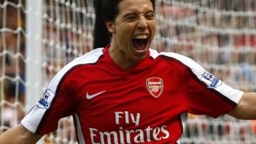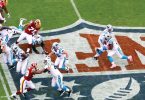This article first appeared in the Nov/Dec 2011 issue of World Gaming magazine.
Elegant technique, a wonderful left foot, splitsecond creativity and a chess player’s vision. These are the weapons of Samir Nasri, the most breathtaking footballer to emerge from the French coastal city of Marseille since the great Zinedine Zidane. Fittingly, Nasri’s extensive bag of tricks includes the iconic “Marseille turn”, the signature move of the master Zidane himself. The most frightening thing is that at just 24 years of age, City’s cocksure new golden boy is yet to peak.
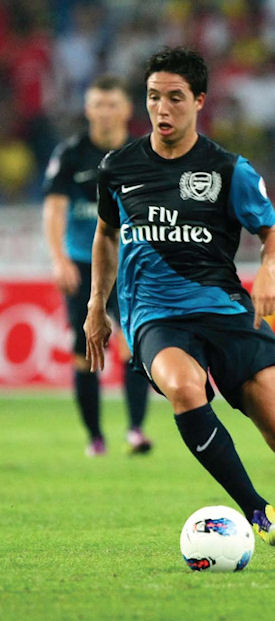
Samir Nasri
In recruiting Nasri Manchester City now boasts the most formidable attacking quartet in the English Premier League. The Frenchman joins Edin Džeko, Sergio Agüero and David Silva to form an embarrassment of offensive riches. Cross-town rivals (and reigning champions) Manchester United won’t have to look beyond their own backyard to identify their biggest title threat. The transfer fees for City’s four stars totalled £110 million. Incredibly, the average age of the men whose superlative skills command such money is just over 24 years. The largest outlay was for Argentinean forward Agüero, whose talismanic services cost the Blue Moon £35 million.
It is Nasri’s £24 million move that will prove the ultimate masterstroke by City powerbrokers. It took the whole of the summer transfer window to finalize the deal, with a stubborn Arsenal intent on retaining their man. The fact that Nasri’s Gunners contract had only one year to run lent a sense of inevitability to the whole protracted affair. Despite an increasingly threadbare Arsenal midfield, Wenger was always fighting a losing battle. It was clear he could not win his fellow Frenchman’s prized signature at the end of the current season, which would have left Nasri free to leave the club with no transfer fee at all. The final figure of £24 million seemed a pittance for a man of Samir Nasri’s ability, but the Londoners’ crippling loss represents City’s clearest chance yet for a concerted tilt at the Premiership title.
City manager Roberto Mancini prefers a 4-2-3-1 formation, and Nasri looms as the final brushstroke in his tactical masterpiece. The cornerstone of Mancini’s game plan is his pair of defensive midfielders – normally Gareth Barry and Yaya Toure – who are charged with the task of protecting the back four. The Italian mastermind then looks to his front four to push the ball forward with pace and flair. Most of the time Edin Džeko goes it alone up front with Agüero playing slightly in behind him. This allows Nasri and Silva to assume the two flank positions. Prior to Nasri’s transfer, Mancini had used two of his English players, Adam Johnson and James Milner, in these wide roles. Both are without doubt solid servants but neither is of Nasri’s quality in terms of sheer creativity and skill.
This upgrade of City’s attacking power netted immediate results. Nasri’s first game in a City shirt was an amazing 5-1 win away at Spurs. The French winger was instrumental in three of the visitor’s goals in a consummate performance. Finally, here was a man to instill genuine self-belief amongst The Blues’ legions of long-suffering fans. For the first time in half a century, Manchester City appears capable of serving it up to the likes of Chelsea, Arsenal, Liverpool and most of all, arch enemy United.
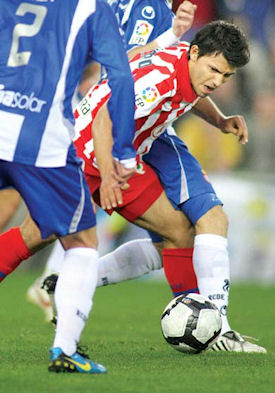
Sergio Agüero
Nasri’s superlative talent was evident from a young age. Learning his trade at Olympique de Marseille, the Frenchman represented his country at all junior levels of the game. In the 2004 UEFA European Under-17 Football Championship, a precocious French outfit dazzled its way to the title over Spain. But it was the performance of their 16-year-old captain Samir Nasri that proved the real revelation. Nasri wore the number ten on his back, homage to boyhood idol Diego Maradona. The teenager demonstrated the same match-winning qualities as his Argentine hero, scoring the winning goal in both the semi-final and the final. When people realized that this skinny little boy came from the same city as Zinedine Zidane, it was only a matter of time before they started calling him “the new Zidane”.
Since those heady junior days, Nasri has grown into a more complete footballer. Quite simply, Mancini had enough cash to obtain the best winger in the world, and he chose Nasri. He could have set his sights on Barcelona’s Chilean superstar Alexis Sánchez, or even tried to steal Ashley Young from under the nose of United. But he made the right choice in Nasri, whose versatility renders him a more complete footballer. Not only can the Frenchman play on the flank, as he did for Arsenal, he can also be relied on to cover a variety of other positions. He would not be out of place as the chief playmaker in any team, a duty he performed with aplomb as a younger footballer. Having already proven himself potent as a striker, Nasri is also capable of slotting into the midfield should injuries force the manager to shuffle his deck. It is this kind of flexibility that will provide Mancini an incredible array of rotational options during the long season ahead.
With fame and fortune, however, comes added pressure and scrutiny. Genius and arrogance sometimes become intertwined. Nasri has not always been a popular figure in the dressing room, with some senior players bristling at an attitude perceived to be cocky and disrespectful. Raised in the tough environment of street football, it appears that the diminutive Frenchman picked up an appetite for the contest at an early age. French defender William Gallas disliked his young teammate enough to launch a scathing attack on Nasri in his autobiography. Gallas claimed that the younger player reacted badly when Gallas tried to help him in a training match. He also went on to mention an incident on the team bus when Nasri disrespected French legend Thierry Henry by occupying Henry’s “lucky” seat. The autobiography angered Nasri to the point where he refused to shake hands with Gallas before a game between Arsenal and Tottenham. No one, not even Wenger, could talk him out of inflaming the situation.
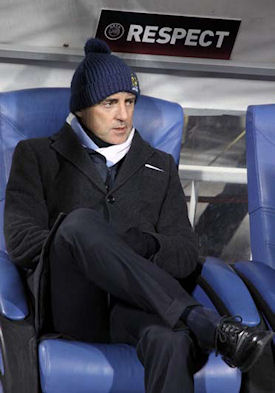
City manager Roberto Mancini
Nasri is quoted as saying “Why should I have to shake his hand in front of the TV cameras? That is not me. I’m not a two faced so and so. When I don’t like someone, I tell them to their face and I don’t shake their hand.”
With this sort of attitude it is unsurprising that Nasri is not the most liked footballer in the business. One of his few allies is former under- 17 teammate Karim Benzema. The pair are good friends on and off the pitch, and appear to be two peas in a pod when it comes to character.
Controversy aside, the Samir Nasri of today is more or less the same young Marseille boy who ate and breathed football. The teenage Nasri greatly admired Maradona, boasting the entire collection of the Argentine’s 1986 World Cup appearances. He was also a big fan of Chris Waddle, and was fascinated by how the onetime Marseille winger seemed to waltz down the left wing with such ease. As a ball boy for Olympique de Marseille, a young Nasri also watched Robert Pirès bursting down the left. He would not only inherit Pirès’ ownership of the left at Marseille, he would follow the same road to EPL stardom via English giants Arsenal. Unlike Pirès, who remains a celebrated figure at Arsenal, it is doubtful that Gunners fans will continue to hold Nasri in such esteem.
Nine years ago, a 15-year-old Nasri predicted himself a superstar of the future. Confident or arrogant, whichever you choose to call it, today few would challenge his statement. Nasri is hungry for success, and his move from a struggling Arsenal to join the rising Manchester City juggernaut appears perfectly timed. Some may brand him disloyal or self-interested. But in the modern game, few players have been known to spurn an increased salary and a greater chance of claiming trophies in favour of dogmatic club loyalty.
Despite his tender years and questionable character, Nasri deserves his status amongst the game’s elite. Marseille has already produced one of the greatest ever in Zinedine Zidane, and perhaps one day, that city’s football lovers will see fit to dub their next big thing “the new Nasri”

